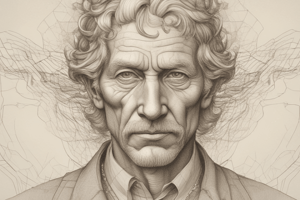Podcast
Questions and Answers
According to Erikson's theory, what is the primary task of the first stage of development (0-1 year)?
According to Erikson's theory, what is the primary task of the first stage of development (0-1 year)?
Developing trust when needs are met consistently
What is the major conflict of the second stage of development (1-3 years)?
What is the major conflict of the second stage of development (1-3 years)?
Autonomy vs. Shame and Doubt
What is the outcome when a child is encouraged to take on tasks and make decisions during the third stage of development (3-6 years)?
What is the outcome when a child is encouraged to take on tasks and make decisions during the third stage of development (3-6 years)?
Development of initiative
What is the psychosocial crisis of the fourth stage of development (6-12 years)?
What is the psychosocial crisis of the fourth stage of development (6-12 years)?
What is the primary task of the fifth stage of development (12-18 years)?
What is the primary task of the fifth stage of development (12-18 years)?
What is the outcome of forming close relationships during the sixth stage of development (18-40 years)?
What is the outcome of forming close relationships during the sixth stage of development (18-40 years)?
What is the psychosocial crisis of the seventh stage of development (40-65 years)?
What is the psychosocial crisis of the seventh stage of development (40-65 years)?
What is the outcome of reflecting on life with a sense of accomplishment during the eighth stage of development (65+ years)?
What is the outcome of reflecting on life with a sense of accomplishment during the eighth stage of development (65+ years)?
Flashcards are hidden until you start studying
Study Notes
Psychosocial Stages of Development
Erik Erikson's theory proposes that individuals go through eight stages of development, each with a unique psychosocial crisis that must be resolved.
Stage 1: Trust vs. Mistrust (0-1 year)
- Development of trust when needs are met consistently
- Mistrust when needs are neglected or inconsistent
Stage 2: Autonomy vs. Shame and Doubt (1-3 years)
- Development of autonomy when encouraged to explore and make decisions
- Shame and doubt when overly restricted or criticized
Stage 3: Initiative vs. Guilt (3-6 years)
- Development of initiative when encouraged to take on tasks and make decisions
- Guilt when discouraged or punished for taking initiative
Stage 4: Industry vs. Inferiority (6-12 years)
- Development of industry when encouraged to develop skills and accomplish tasks
- Inferiority when unable to meet expectations or feeling incompetent
Stage 5: Identity vs. Role Confusion (12-18 years)
- Development of identity when exploring roles and interests
- Role confusion when unsure of identity or feeling pressured to conform
Stage 6: Intimacy vs. Isolation (18-40 years)
- Development of intimacy when forming close relationships
- Isolation when unable to form meaningful relationships
Stage 7: Generativity vs. Stagnation (40-65 years)
- Development of generativity when contributing to society and guiding others
- Stagnation when feeling unproductive or disconnected from society
Stage 8: Integrity vs. Despair (65+ years)
- Development of integrity when reflecting on life with a sense of accomplishment
- Despair when feeling regret or disappointment about life choices
Psychosocial Stages of Development
Stage 1: Trust vs. Mistrust (0-1 year)
- Trust develops when caregivers consistently meet the infant's needs
- Mistrust occurs when needs are neglected or inconsistently met
Stage 2: Autonomy vs. Shame and Doubt (1-3 years)
- Autonomy emerges when children are encouraged to explore and make decisions
- Shame and doubt develop when children are overly restricted or criticized
Stage 3: Initiative vs. Guilt (3-6 years)
- Initiative develops when children are encouraged to take on tasks and make decisions
- Guilt occurs when children are discouraged or punished for taking initiative
Stage 4: Industry vs. Inferiority (6-12 years)
- Industry develops when children are encouraged to develop skills and accomplish tasks
- Inferiority complex emerges when children feel they are unable to meet expectations or feel incompetent
Stage 5: Identity vs. Role Confusion (12-18 years)
- Identity forms when adolescents explore roles and interests
- Role confusion occurs when adolescents are unsure of their identity or feel pressured to conform
Stage 6: Intimacy vs. Isolation (18-40 years)
- Intimacy develops when young adults form close relationships
- Isolation occurs when young adults are unable to form meaningful relationships
Stage 7: Generativity vs. Stagnation (40-65 years)
- Generativity develops when middle-aged adults contribute to society and guide others
- Stagnation emerges when middle-aged adults feel unproductive or disconnected from society
Stage 8: Integrity vs. Despair (65+ years)
- Integrity develops when older adults reflect on their life with a sense of accomplishment
- Despair occurs when older adults feel regret or disappointment about their life choices
Studying That Suits You
Use AI to generate personalized quizzes and flashcards to suit your learning preferences.





